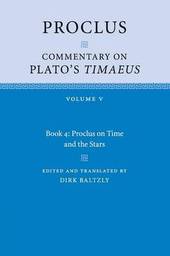
|
Proclus: Commentary on Plato's Timaeus: Volume 5, Book 4
Paperback / softback
Main Details
| Title |
Proclus: Commentary on Plato's Timaeus: Volume 5, Book 4
|
| Authors and Contributors |
By (author) Proclus
|
|
Edited and translated by Dirk Baltzly
|
| Series | Proclus: Commentary on Plato's Timaeus |
|---|
| Physical Properties |
| Format:Paperback / softback | | Pages:360 | | Dimensions(mm): Height 229,Width 152 |
|
| Category/Genre | Western philosophy - Ancient to c 500 |
|---|
| ISBN/Barcode |
9781316505250
|
| Classifications | Dewey:184 |
|---|
| Audience | | Postgraduate, Research & Scholarly | |
|---|
| Illustrations |
Worked examples or Exercises
|
|
Publishing Details |
| Publisher |
Cambridge University Press
|
| Imprint |
Cambridge University Press
|
| Publication Date |
7 January 2016 |
| Publication Country |
United Kingdom
|
Description
Proclus' commentary on Plato's dialogue Timaeus is arguably the most important commentary on a text of Plato, offering unparalleled insights into eight centuries of Platonic interpretation. It has had an enormous influence on subsequent Plato scholarship. This edition offers the first new English translation of the work for nearly two centuries, building on significant recent advances in scholarship on Neoplatonic commentators. It provides an invaluable record of early interpretations of Plato's dialogue, while also presenting Proclus' own views on the meaning and significance of Platonic philosophy. The present volume, the fifth in the edition, presents Proclus' commentary on the Timaeus, dealing with Proclus' account of static and flowing time; we see Proclus situating Plato's account of the motions of the stars and planets in relation to the astronomical theories of his day. The volume includes a substantial introduction, as well as notes that will shed new light on the text.
Author Biography
Dirk Baltzly is Professor of Philosophy at the University of Tasmania. He was educated at Ohio State University and has worked previously at King's College London and Monash University, Victoria. He has published widely on ancient Greek philosophy, with particular emphasis on late antique Platonism. He is a Fellow of the Australian Academy of Humanities.
|